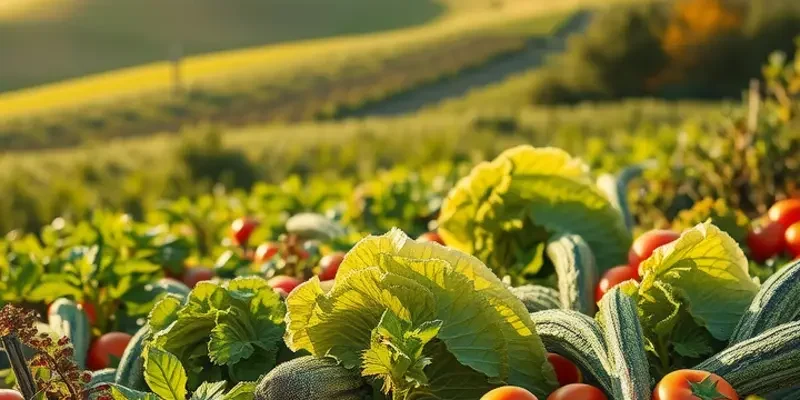Choosing an eco-friendly diet not only benefits your wellbeing but also positively impacts the planet. With the right food choices, individuals can significantly reduce their ecological footprint while promoting sustainability. Discover how to navigate your meals mindfully and foster an environmentally-conscious lifestyle without compromising on taste or nutrition.
Rethinking Food Choices: The Power of Plant-Based Eating

Incorporating more plant-based foods into your diet offers profound environmental benefits. By making informed choices, you can significantly reduce your ecological footprint. This chapter explores how shifting towards plant-based eating can help conserve resources, reduce greenhouse gases, and promote biodiversity.
Animal agriculture is a major contributor to environmental issues. It requires extensive land use, leading to deforestation and habitat destruction. Moreover, livestock farming is responsible for a significant percentage of anthropogenic greenhouse gas emissions. Methane from cattle and nitrous oxide from fertilizers exacerbate climate change. Transitioning to plant-based diets can mitigate these effects by reducing demand for land and lowering emissions.
Water usage in animal agriculture is another critical concern. It takes thousands of gallons of water to produce a single pound of beef, whereas plant-based foods like vegetables, grains, and legumes require far less. By choosing a diet that prioritizes these foods, you can help conserve this vital resource, crucial in regions experiencing frequent droughts.
Opting for plant-based proteins such as beans, lentils, and tofu offers viable alternatives to animal products. They supply necessary nutrients without the environmental burden. Whole grains, seeds, and nuts contribute additional protein and fats, supporting both health and sustainability. These ingredients not only provide essential nutrients but also help diversify agricultural practices, which can improve soil health and crop resilience.
The biodiversity crisis is linked to monoculture practices prevalent in animal feed production. By embracing a wider variety of plants, we can support biodiversity. Encouraging a diet rich in seasonal and locally sourced produce further minimizes the carbon footprint associated with long-distance food transportation.
Shifting behaviors and habits can be challenging, yet even small changes matter. Integrating plant-based meals gradually, such as designating a day each week for plant-only meals, can make the transition smoother. For more tips on simplifying meal planning and introducing plant-based foods into your diet, you can explore these weekly meal planning strategies.
Adopting a plant-based lifestyle does not mean sacrificing culinary diversity. On the contrary, it invites exploration of world cuisines rich in vegetarian options. A culinary journey through global snack traditions or ancient cooking techniques can enhance your appreciation for plant-based meals. Not only do these options contribute to personal well-being, but they also align with the larger goal of a more sustainable planet.
By rethinking food choices and taking inspired action towards plant-based eating, you can play a pivotal role in nurturing the Earth. Such choices offer a powerful way to minimize the ecological impact of your diet, ensuring a healthier and more sustainable future for all.
Sourcing Sustainably: The Impact of Local and Seasonal Eating

Choosing to eat local and seasonal foods is a powerful step towards a sustainable lifestyle. It minimizes transportation emissions and reduces energy usage, helping you tread lightly on our planet. When you purchase fresh produce that is grown close to home, you directly reduce the carbon footprint associated with long-distance food transport. Less fuel is burned during shipment, translating to fewer greenhouse gases released into the atmosphere.
Moreover, local foods are often fresher and tastier due to the reduced time between harvest and consumption. By sourcing food locally, you also support local farmers, fostering a stronger economic foundation in your community. This keeps money circulating within the local economy, providing jobs and supporting agricultural sustainability.
Embracing seasonal produce aligns your diet with the natural growing cycles in your area. This approach typically involves less reliance on intensive agricultural practices that can be damaging to the environment. Seasonal foods often require fewer artificial inputs such as chemical fertilizers and extensive energy for greenhouses, making them a more eco-friendly choice.
Eating seasonally encourages biodiversity. Farmers grow a variety of crops throughout the year, rather than relying on monocultures. This diversity ensures healthier soil and ecosystems, supporting the resilience of plants against pests and diseases. Furthermore, when consumers are aware of and interested in seasonal offerings, it motivates farmers to pay attention to biodiversity, enriching the local ecology.
In addition to these environmental benefits, local and seasonal eating can enhance community relationships. Farmers’ markets and community-supported agriculture (CSA) programs provide spaces for social interaction, education, and collaboration. These settings foster a deeper understanding of where food comes from and the labor involved in its production.
To integrate these practices into your lifestyle, consider exploring ancient cooking techniques that make the most of seasonal ingredients. By learning about cooking methods that utilize local traditions and resources, you can further minimize waste and appreciate the full flavor and nutrition of your meals. For guidance on these techniques, visit our ancient cooking techniques guide.
The choice to eat locally and seasonally is more than just a decision; it is a commitment to a healthier planet. It strengthens local economies, helps maintain agricultural biodiversity, and supports a more connected and informed community. These small, conscious choices build the foundation for a more sustainable food system, demonstrating that individual dietary decisions can significantly impact the world around us.
Final words
Minimizing your ecological diet impact is within reach, and it starts with simple, conscious choices. By embracing plant-based meals and opting for local and seasonal produce, you not only improve your health but also contribute positively to the planet’s health. Remember, every small action counts. Choose foods that nourish both you and the environment, support sustainable practices, and encourage others to join in this vital movement. Together, we can create a greener, more sustainable world, one meal at a time.








